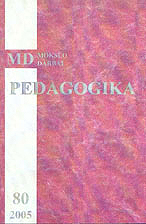Jaunesniojo mokyklinio amžiaus vaikų fizinio ugdymo humanizavimo galimybės per kūno kultūros pamokas
Possibilities for Humanizing Physical Education of Junior Schoolchildren in Physical Education Lessons
Author(s): Rolandas JančiauskasSubject(s): Education
Published by: Vytauto Didžiojo Universitetas
Keywords: humanizing physical education; junior schoolchildren; physical education lessons
Summary/Abstract: Summarizing the results of the research, it was found that 58,6% of children responded that their health is good. Children who took exercises together with their parents were more active and happier in physical education lessons. 45,4% of children experienced joy most of all being with their parents in the nature and 44,5% taking part in physical education lessons. Girls (50,4%) experienced more joy in physical education lessons than boys (21,4%) during training sessions. 75,3% of children liked physical education lessons. Both boys (79,5%) and girls (71,3%) liked the lessons. 57,3% of children found physical education lessons interesting. 10,1% of children said physical education lessons are difficult, some of the tasks given by the teachers are hard to perform because of overweight or a weaker physical preparation. 48,0% of all respondents wished games with a ball, and 40,5% of them requested relay-race in physical education lessons. More boys wished games with a ball – 57,1%, and 43,5% of girls wanted relay-race in physical education lessons. 15,0% of physically weaker children also wanted to take part in physical education lessons actively and not to stay away, so they requested exercises that would be easier to perform. 31.3% of boys and 27,0% of girls wanted individual exercises. Children who are of a weaker health requested individual exercises more often. 38,2% of girls and 26,8% of boys wanted more attention to be paid to them. 21,1% of the children missed goodwill in relationship with a teacher, 19,8 % reciprocal understanding, 10,6% – respect and 18,5% missed other values. Children missed communication with a teacher in physical education lessons. 38,3% of children missed reciprocal understanding, 29,1% – goodwill, 18,9% – respect and 14,5% missed other values in relationship with their friends in physical esucation lessons. 38,8% of respondents claimed that physical education makes a positive impact on their inner life. Physical education had a bigger impact on boy‘s inner life (44,6%) than on girl‘s (33,0%).
Journal: Pedagogika
- Issue Year: 2005
- Issue No: 80
- Page Range: 91-96
- Page Count: 6
- Language: Lithuanian

